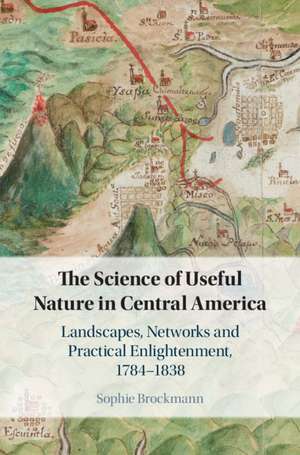The Science of Useful Nature in Central America: Landscapes, Networks and Practical Enlightenment, 1784–1838
Autor Sophie Brockmannen Limba Engleză Hardback – 16 sep 2020
| Toate formatele și edițiile | Preț | Express |
|---|---|---|
| Paperback (1) | 223.08 lei 6-8 săpt. | |
| Cambridge University Press – 26 oct 2022 | 223.08 lei 6-8 săpt. | |
| Hardback (1) | 600.16 lei 6-8 săpt. | |
| Cambridge University Press – 16 sep 2020 | 600.16 lei 6-8 săpt. |
Preț: 600.16 lei
Preț vechi: 674.34 lei
-11% Nou
Puncte Express: 900
Preț estimativ în valută:
114.84€ • 122.80$ • 95.75£
114.84€ • 122.80$ • 95.75£
Carte tipărită la comandă
Livrare economică 17 aprilie-01 mai
Preluare comenzi: 021 569.72.76
Specificații
ISBN-13: 9781108421232
ISBN-10: 1108421237
Pagini: 320
Dimensiuni: 160 x 235 x 25 mm
Greutate: 0.54 kg
Editura: Cambridge University Press
Colecția Cambridge University Press
Locul publicării:Cambridge, United Kingdom
ISBN-10: 1108421237
Pagini: 320
Dimensiuni: 160 x 235 x 25 mm
Greutate: 0.54 kg
Editura: Cambridge University Press
Colecția Cambridge University Press
Locul publicării:Cambridge, United Kingdom
Cuprins
Introduction. A kingdom of vast extension; 1. Landscape, ruins, and governance; 2. Networks of knowledge and action; 3. Making enlightenment local; 4. Useful geography in practice; 5. Transforming environments; 6. Independence and useful nature; Conclusions; Glossary of colonial administrative terms; Bibliography; Index.
Recenzii
'Moving well beyond the well-trodden historical terrain of Western Europe and the British Atlantic World, Brockmann forcefully demonstrates how new insights into the histories of science, the Enlightenment, and modernity as well as colonialism and the nation-state can be gained by considering these phenomena from the perspective of Central America.' Matthew James Crawford, Kent State University
'Brockmann's ground-breaking book expertly and engagingly brings Central America into view as eighteenth- and nineteenth century reformers saw it, a laboratory in which scientific engagement was harnessed to encourage economic development, state making and cultural change. Deeply researched and compelling, her argument and analysis will be a must read for those working on the region.' Jordana Dym, Skidmore College, New York
'Sophie Brockmann's learned and elegant treatment of Central American science in the age of Enlightenment will change the way we think about knowledge-making in Spanish America. While never losing sight of the ground-level view - ruins and rice and plantains - The Science of Useful Nature offers expansive, novel panoramas on a new world epistemology that is both distinctly Central American and ineluctably global.' Sylvia Sellers-García, Boston College
'The Science of Useful Nature will be a welcome contribution to graduate seminars on eighteenth-century networks, information history, and Latin American history, especially courses on Central America and revolutions.' Allison Margaret Bigelow, Agricultural History
'… richly detailed and engaging … [a] very fine study.' Kevin Gosner, Hispanic American Historical Review
'Brockmann's ground-breaking book expertly and engagingly brings Central America into view as eighteenth- and nineteenth century reformers saw it, a laboratory in which scientific engagement was harnessed to encourage economic development, state making and cultural change. Deeply researched and compelling, her argument and analysis will be a must read for those working on the region.' Jordana Dym, Skidmore College, New York
'Sophie Brockmann's learned and elegant treatment of Central American science in the age of Enlightenment will change the way we think about knowledge-making in Spanish America. While never losing sight of the ground-level view - ruins and rice and plantains - The Science of Useful Nature offers expansive, novel panoramas on a new world epistemology that is both distinctly Central American and ineluctably global.' Sylvia Sellers-García, Boston College
'The Science of Useful Nature will be a welcome contribution to graduate seminars on eighteenth-century networks, information history, and Latin American history, especially courses on Central America and revolutions.' Allison Margaret Bigelow, Agricultural History
'… richly detailed and engaging … [a] very fine study.' Kevin Gosner, Hispanic American Historical Review
Notă biografică
Descriere
Demonstrates the role of local and global scientific knowledge about landscapes and environment in shaping Central America.
